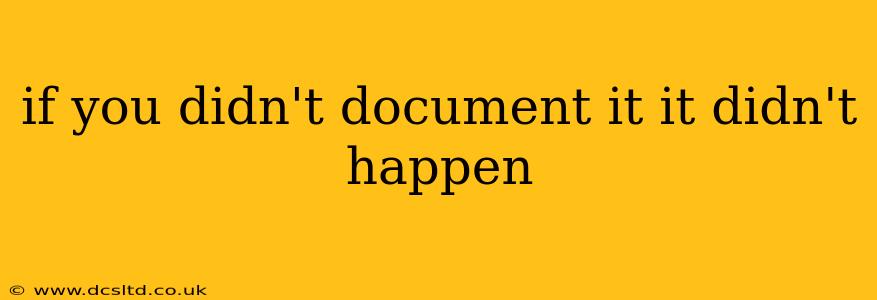In today's fast-paced world, the adage "If you didn't document it, it didn't happen" rings truer than ever. While it might sound overly strict, the principle underscores the critical importance of meticulous documentation in virtually every aspect of life, from personal projects to large-scale corporate endeavors. Effective documentation isn't just about record-keeping; it's about building a foundation for accountability, efficiency, and success.
Why is Documentation So Crucial?
The benefits of comprehensive documentation extend far beyond simply having a paper trail. Let's explore the key reasons why documenting everything is paramount:
-
Accountability and Transparency: Documentation provides a clear audit trail, making it easy to track progress, identify responsible parties, and resolve disputes. This transparency fosters trust and accountability within teams and organizations. Without it, disagreements are harder to settle, and blame can easily be shifted.
-
Improved Efficiency and Productivity: Clear documentation allows team members to quickly access information, reducing time spent searching for answers or repeating tasks. This streamlined workflow boosts overall efficiency and productivity, saving valuable time and resources. Imagine trying to build a complex software program without detailed design documents – the process would be chaotic and incredibly inefficient.
-
Knowledge Retention and Transfer: Documentation preserves institutional knowledge. When employees leave, documented processes and procedures ensure that valuable expertise isn't lost. This seamless knowledge transfer is crucial for maintaining organizational continuity and preventing disruptions.
-
Risk Mitigation and Compliance: Thorough documentation is essential for mitigating risks and ensuring compliance with regulations. In industries with strict compliance requirements (like healthcare or finance), documentation is not just advisable; it's legally mandated. Proper documentation can help protect against legal issues and financial penalties.
-
Problem Solving and Troubleshooting: When problems arise, detailed documentation helps in quickly identifying the root cause and implementing effective solutions. This proactive approach prevents similar issues from recurring and improves the overall quality of work.
What Should You Document?
The specifics of what needs documenting will vary depending on the context. However, some common elements include:
- Processes and Procedures: Clearly outline steps involved in key tasks and workflows. This ensures consistency and quality.
- Decisions and Rationale: Record the reasoning behind important decisions, including alternatives considered and the rationale for the chosen path. This improves transparency and allows for future review and learning.
- Data and Findings: Document all relevant data, research findings, and experimental results. This ensures the reproducibility of results and facilitates future analysis.
- Communication Logs: Maintain a record of all important communications, including emails, meeting minutes, and phone calls. This helps to avoid misunderstandings and track progress.
- Project Milestones and Deadlines: Clearly define key project milestones and associated deadlines. This helps to maintain focus and track progress effectively.
How Can I Improve My Documentation Habits?
Implementing effective documentation strategies doesn't have to be overwhelming. Start by:
- Choosing the Right Tools: Utilize document management systems, project management software, or even simple spreadsheets to organize your documentation.
- Establishing Clear Standards: Develop consistent naming conventions and formatting standards to ensure readability and searchability.
- Making it Accessible: Ensure your documentation is easily accessible to all relevant parties.
- Regularly Reviewing and Updating: Keep your documentation up-to-date to reflect changes and ensure accuracy.
Frequently Asked Questions
What are some common mistakes people make with documentation?
Common mistakes include inconsistent formatting, incomplete information, lack of context, and infrequent updates. Poorly written or disorganized documentation is as bad as no documentation at all.
What are the best tools for documentation?
There's a wide range of tools available, from simple word processors to sophisticated project management software like Asana, Trello, or Monday.com. The best tool depends on your specific needs and preferences. Consider your budget and the complexity of your projects when making a selection.
How can I make my documentation more engaging?
Use clear and concise language, visuals like charts and graphs, and a logical structure. Make it easy to scan and understand, even for someone unfamiliar with the topic.
In conclusion, the saying "If you didn't document it, it didn't happen" is a powerful reminder of the critical role that documentation plays in success. By embracing meticulous documentation practices, individuals and organizations can enhance accountability, improve efficiency, mitigate risks, and achieve their goals. It's an investment in clarity, transparency, and ultimately, success.
